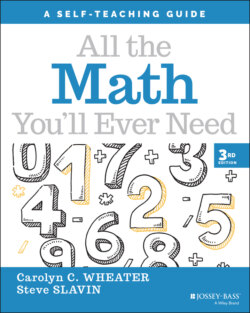Читать книгу All the Math You'll Ever Need - Steve Slavin - Страница 11
1 Getting Started
ОглавлениеFar too many Americans are mathematically illiterate. Although many of these people are college graduates, they have trouble doing simple arithmetic. One cannot help but wonder how so many people managed to get so far without having mastered basic arithmetic. Math phobia seems to have become fashionable. People who would never think it amusing to claim not to be able to read or write chuckle as they announce, “I can't do math.”
We all have to deal with numbers sometime—in banking, on taxes, in choosing a mortgage. Like it or not, numbers are an important part of our lives, and the importance of numerical literacy is increasing in finance, economics, science, government, and more. It is time math stopped intimidating us.
What we'll be doing in this book is going back to basics. We'll focus on the multiplication table. You'll need to memorize it. If you need an even more basic text, you can refer to one such as Quick Arithmetic: A Self-Teaching Guide, 3rd edition by Robert A. Carmen and Marilyn J. Carmen (Wiley, 2001).
In All the Math You'll Ever Need, the use of complex formulas is generally avoided. Although such formulas have an honored place in mathematics, they rarely need to be memorized. The ones that are used frequently work their way into memory. The others can be looked up when they're needed.
Finally, the use of technical terms is minimized whenever possible. Having the vocabulary to describe mathematical ideas and operations accurately is important to learning but you don't need a lot of fancy language for that. There are no quadratic formulas, logarithmic tables, integrals, or derivatives, and there are only a handful of very simple graphs.
This book was designed to be explored without ever using a calculator or computer. Don't get nervous. You will not be asked to throw away your calculator. Just put it in a safe place for now, to be taken out and used only on proper occasions. A calculator is most effectively used for three tasks: (1) to do calculations that need to be done rapidly, (2) to do repetitive calculations, and (3) to do sophisticated calculations that would take a great deal of time to do without a calculator. Calculators and computers are fast and as accurate as their users allow them to be. Typos are a thing, even on calculators. You need to first know what you want to ask the calculator to do, and then have enough math knowledge to decide if the answer it gives you makes sense.
The trick is to use our calculators for these specific tasks and not for arithmetic functions that we can do in our heads. So put away your calculator and start using your innate mathematical ability.
